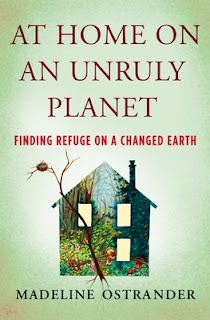At Home on an Unruly Planet by Madeline Ostrander discusses the effects of climate change on our sense of home, community, tradition, and history. As it is often difficult to follow all the dominoes that have been set off by a warming planet, Ostrander looks at a few places specifically to illustrate the larger picture.
Many of us have recognized, if even in a vague way, that there will be more climate refugees as people lose homes and/or an economic base to the changing climate . In some regions, especially in coastal regions, the movement away from the encroaching sea and more frequent and powerful storms has been recognized for years.
The damage to the coastal areas of our country and to the livelihoods of people who, for generations, have depended on the sea (and who have lost homes and possessions many times)--for these people, the recurring losses can create a sense of homelessness that is beyond housing. It is the loss of a way of life that includes family history, community, culture and hope for the next generation.
By looking at a few places in greater detail, Ostrander lets readers extrapolate that information to apply in varying degrees to all disaster prone areas. The country and the world is confronting climate disasters, experiencing higher tides, more frequent and severe flooding, drought, and wildfires. These catastrophes result in the loss of local histories, traditions, culture, historic buildings, and communities as well as individual homes. Ostrander examines instances in which communities struggle to prepare for more change, but there are also places where continuing the fight is no longer feasible; where individuals and entire areas have accepted that they have to let go.
Ostrander looks at an Inuit village in Alaska lost to the sea and thawing tundra that must relocate an entire village (there are more since Ostrander visited and researched Newtok); the fires in the Pacific North West that burn hotter, faster, and more frequently; the effect of pollution on the local population from a refinery in Richmond, CA; and the loss of historic buildings in St. Augustine, FL. Her writing is personal and reflects on predictions of how and when the warming climate will make changes in our lives, what is being done to prepare for the changes, and what must yet be done to ease the transitions that are required.
Individuals can and should plan and prepare (as those in wildfire areas and in areas threatened by flooding know--having a go bag with important papers, water, food, flashlights, etc. can make a huge difference in case of a disaster). Communities are often more effective working together as a unit, harnessing the talents and knowledge of its citizens when an emergency occurs. Individuals and even communities, however, cannot prevent or mediate climate change emergencies on their own. It is imperative that local, state, and national government be involved in planning for the changes to come.
Highly Recommended.
NetGalley/Henry Holt & Co
Nonfiction/Climate Preparedness. Aug. 2, 2022. Print length: 352 pages.



Love that guy waiting for Godot! :D
ReplyDeleteI admit to cackling when I saw that one!
DeleteIt's definitely a thought-provoking issue and onto another topic that despite all the recycling and the Go Green awareness, I think we're still creating a lot of waste. :(
ReplyDeleteYou are right, Melody. We aren't making the progress we should be in so many areas. Our children and grandchildren will have to live with the consequences. It's depressing.
DeleteI'm adding this one to my TBR list. Thanks for your excellent review.
ReplyDeleteI liked the approach Ostrander takes on climate change by concentrating on what we are losing and why we should be preparing for the changes to come.
DeleteHouston is a sinking city, and I often wonder what it will be like in 50-75 years. Much of the downtown area, I believe, is near sea level or barely above it, and some of our downtown flooding has been catastrophic already. Scary stuff ahead, I'm afraid.
ReplyDeleteLove that photo. LOL
My thoughts went immediately to the Louisiana coast and New Orleans for the same reasons, Sam. Entire communities of tradition and culture are dealing with the incremental stress of repeated catastrophes. It really is scary stuff.
DeletePicked up King's, "Mr Mercedes," today. Thank you
ReplyDeleteIt's a creepy read, but King does create great characters!
DeleteLove that photo! I needed that laugh today. :D
ReplyDeleteMade me laugh! I always need something to make me laugh or smile!
DeleteAn excellent review that added another book to my Need-to-Read list-- and "godot" is priceless; I really really really needed that laugh today!
ReplyDeleteAt Home on an Unruly Planet was a thoughtful and interesting look at all of things that go into the idea of "home."
DeleteReading your review today at the same time I am getting reports of the terrible damage caused in Northern Europe by recent storms really helps hammer this home. I worry about the world we are bequeathing future generations. I do try to do what I can as an individual, but your last sentence is correct - local, state and federal government need to act to make any real impact.
ReplyDeleteThat picture is hilarious. I wonder if it was staged or if it really happened that he was picking up a Mr./Ms. Godot! LOL.
Yes, it seems almost daily that we the terrible damage from one weather event or another. I just looked at a house balancing on a cliff on the coast of Britain which is such a vivid example. All governments have been slow to prepare and the costs of "environmental evacuation" are emotional and economic.
DeleteI assume the airport "waiting for Godot" was staged, but so funny!
I worry about the folks who live in the areas that'll be directly affected by rising water. Scary.
ReplyDeleteLove the Waiting for Godot image. I'm gonna share it to FB ;)